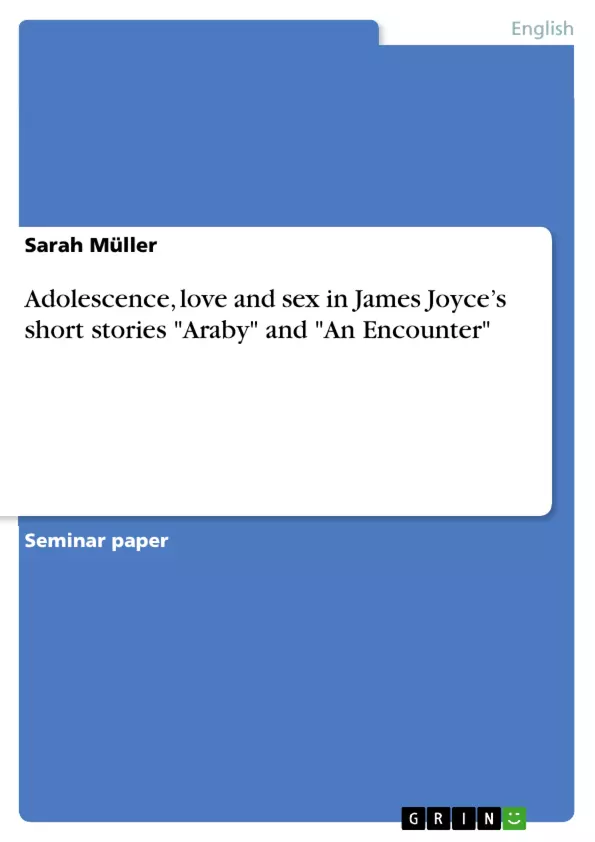Analyse zweier Kurzgeschichten von James Joyce "Araby" und "An Encounter" aus dem Sammelband "Dubliners"
This essay deals with the themes of adolescence, love and sex in two of
Joyce's short stories: An Encounter and Araby. The first part examines the
protagonist of An Encounter, how he differs from his friends and his being
contemptuous of them. His realisation that he cannot despise them because he
might be dependent on them is the conclusion of the "encounter with strangeness
and fascination". The second part examines the protagonist of Araby and his
existence as a puppet led by Mangan's sister. Both parts end with a short digression into symbolic colours. The last part – the vicious circle – compares both stories in terms of being on the edge of adolescence and ends with the foreshadowing of the boys becoming paralysed adults.
I N D E X
Introduction
1. An Encounter
1.1. Detective vs. cowboys
1.2. Encounter with strangeness and fascination
1.3. Symbolism – Colours
2. Araby
2.1. The puppet
2.2. Symbolism – Colours and odours
3. The vicious circle: Comparison of An Encounter and Araby
Bibliography
INTRODUCTION
This essay deals with the themes of adolescence, love and sex in two of Joyce's short stories: An Encounter and Araby. The first part examines the protagonist of An Encounter, how he differs from his friends and his being contemptuous of them. His realisation that he cannot despise them because he might be dependent on them is the conclusion of the "encounter with strangeness and fascination". The second part examines the protagonist of Araby and his existence as a puppet led by Mangan's sister. Both parts end with a short digression into symbolic colours. The last part – the vicious circle – compares both stories in terms of being on the edge of adolescence and ends with the foreshadowing of the boys becoming paralysed adults.
1. AN ENCOUNTER
1.1. Detective vs. cowboys
In the beginning of the story the reader is led into an imagined world of the Wild West. The protagonist is involved in this world and its "Indian battles"[1] but only because it is the only play his peers seem to enjoy. His part is the role of the "reluctant Indian"[2] because he would prefer to play being an American detective.
The detective's world is a world out of order in which he has to use his subtle mind to fight against the evil. In this environment there is no open battle nor physical power. It is a subtile world where things happen secretly. In contrast to a detective story which takes place on a psychological level an adventure of the Wild West takes place on a physical level. The cowboy's world is a loud world full of fights. Even the name 'Wild West' gives a notion of how this world is ruled. It is superficial. One must not look beneath the surface because there is nothing to look for.
The Dillon boys and Mahony prefer the Wild West. Its pattern is easy to understand: The cowboy/sheriff has to restore the world's order by physical strength. A sheriff is the embodiment of a 'real man' in a world where gender roles are clearly defined. It is therefore easy for the boys to identify themselves with masculinity. For the boy narrator it is not that easy to accept the masculinity of the Wild West. It is too simple for him which is why he prefers the detective. A detective is not defined as a 'real man'. It actually does not matter whether he is male or not. He is simply a person which happens to be male.
The different roles are presented when the boy narrator and Mahony meet the old man. "Then he asked us which of us had the most sweethearts. Mahony mentioned [...] that he had three totties. The man asked me [...] I answered that I had none."[3] The boy narrator has an unstructured notion of his existence as a man. The only way he knows of how to be a man is being a cowboy, which he refuses. He is searching for more but has not yet found what he is looking for. Although a child, he realizes in his commencing adolescence that one cannot take the set-up roles but has to find one's own. He is a sensitive boy who mediates on his life and future. One component why he joins the battles is that "at least, they opened doors of escape"[4]. He is the only one, like a detective, who sees more than simply fun in those games.
The Dillon family represents the narrow-minded Irish Catholics. The "parents go to eight-o'clock mass every morning"[5] and Joe Dillon, "the craziest Indian of them all, [...] decides to become a priest"[6]. Because he has been the craziest Indian he has learned to accept the set-up rules and has become a priest in the Catholic Ireland, where priests have a high reputation. This reputation is also shown in school when the teacher, Father Butler, discovers Leo Dillon reading a book about the Wild West. The teacher influences the boy so much that the trip to the Pigeon house would be too much for him and he shirks it.
[...]
[1] Joyce, Dubliners, 18
[2] ibid.
[3] Joyce, Dubliners, 25
[4] Joyce, Dubliners, 19
[5] Joyce, Dubliners, 18
[6] Leonard, Reading Dubliners Again, 59
- Quote paper
- Sarah Müller (Author), 2004, Adolescence, love and sex in James Joyce’s short stories "Araby" and "An Encounter", Munich, GRIN Verlag, https://www.grin.com/document/91232



